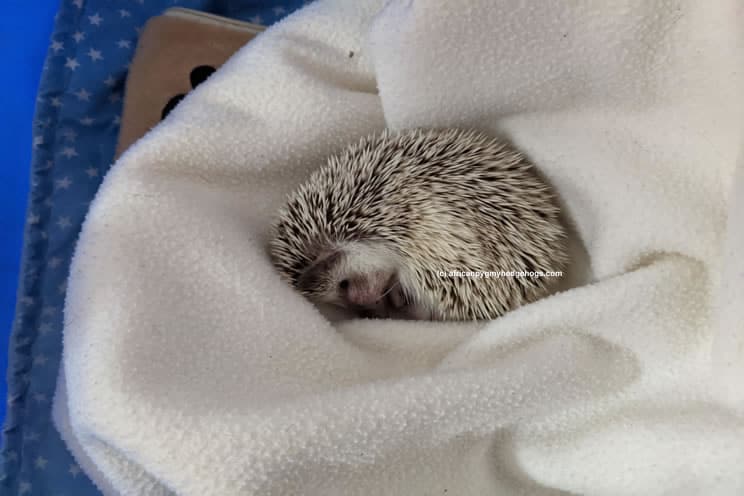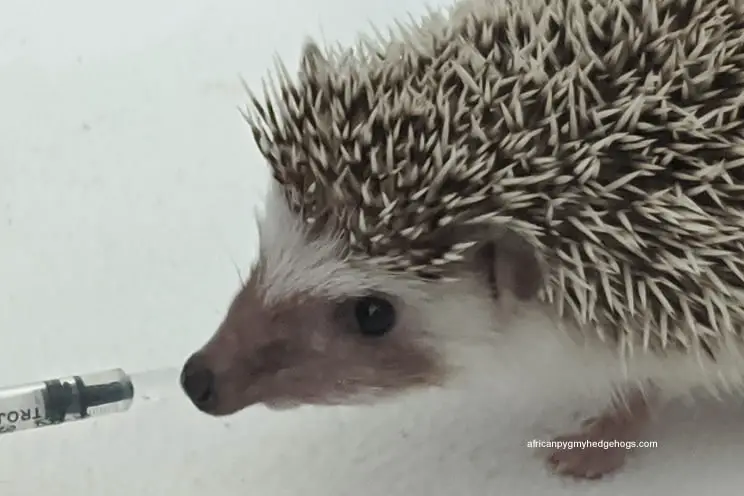
It is essential for anyone keeping or intending to keep a hedgehog as a pet to gather enough information about these adorable animals to ensure they know how to help them live a healthy and long life. For instance, it is crucial to understand what constitutes a proper diet and the diseases that affect these animals.
So, do hedgehogs die easily? Hedgehogs can die easily, with death from poor diets and diseases being the major factors that affect the lifespan of hedgehogs. Moreover, since hedgehogs hide their illnesses, many people cannot tell when these creatures are sick or almost dying until it is too late.
A hedgehog is a unique animal, and with its unique nature comes the need for special care. Therefore, read on for factors that affect a hedgehog’s lifespan, signs of a dying hedgehog, and how you can help an ill hedgehog.
Two Main Factors That Affect the Lifespan of Hedgehogs
In the wild, hedgehogs mainly die after they fall prey to predators. Because of predators, hedgehogs live for around 2-3 years in the wild.
For pet hedgehogs, life expectancy differs significantly from one hedgehog to the other. The average life expectancy of pet hedgehogs is five years. Some hedgehogs live for more than five years, while others die before the five-year mark. The variance in life expectancy among these animals arises due to various factors.
Two of the factors that influence hedgehogs’ longevity are:
1. Diet
Regardless of the type of pet, diet is one of the most important things that people need to focus on to ensure pets live for a considerable amount of time. Choosing the right diet can help hedgehogs live long healthy lives, whereas one wrong choice could have devastating effects.
Following breeders’ recommendations is of utmost importance. After acquiring a hedgehog from any breeder, hedgehog owners should follow the recommendations for no less than a month. After that, the transition can happen slowly and only if it is in the hedgehog’s best interest.
Hedgehogs have unique needs. It is best to provide them with a varied diet. A hedgehog should not be attached to only one type of food. If they become attached and at some point, that food runs out, problems could arise.
Different experts recommend different foods for hedgehogs—the debate about what is best for these creatures is never-ending. Despite the debates, there are some general recommendations that hedgehog owners can consider.
Hedgehogs appreciate diets filled with meaty protein foods. Insects are perfect for hedgehogs since they are insectivores. However, avoiding any insects that are not balanced in phosphorous and calcium is crucial.
The proper balance of calcium and phosphorous is crucial because it prevents diseases such as metabolic bone disease. MBD can lead to death if not quickly treated.
Being careful not to give acidic food to hedgehogs is also essential because acidic food can cause ulcers. Avocados, raisins, and grapes are not suitable for hedgehogs. Hedgehogs are also lactose intolerant, so feeding them milk is risky.
2. Diseases
Many pet hedgehogs die due to cancer and tumors. Three-year-old hedgehogs are more prone to cancer. Tumors affect almost all their body parts, and any hedgehog suffering from a tumor is likely to die. Unfortunately, it is often difficult to tell when a hedgehog has a tumor.
Another disease that affects hedgehogs is obesity, and, unfortunately, many pet hedgehogs are overweight. Rationing the food hedgehogs eat is vital to avoid obesity. Maintaining a balanced diet is also a way of protecting hedgehogs from obesity. Exercise is also vital for hedgehogs to prevent obesity.
Wild hedgehogs usually run several miles at night, and that is why they are rarely obese. To ensure pet hedgehogs exercise enough, providing them with a large enclosure that can accommodate an exercise wheel is essential. Allowing them out of their cages to exercise and socially interact can also help prevent obesity.
It is vital to note that few diseases can cause the sudden death of a healthy hedgehog. Cancer, obesity, and tumors kill hedgehogs gradually. However, heart diseases can cause healthy hedgehogs to die suddenly. The disease is common among old hedgehogs. Obese hedgehogs are also prone to heart disease. Read more about hedgehog diseases : 8 common hedgehog diseases.
With well-balanced diets, close monitoring of diseases, and enough exercise, hedgehogs can live up to seven years. Others can live for a much more extended period, so there is no exact number that you can attach to these tough creatures’ lifespan.
How do you know when your hedgehog is dying?
There may be visible signs your hedgehog is dying like lumps appearing on their face and body, which are most likely tumors. Changes in habits, like drinking water more than normal, could indicate cancers in organs like their liver. Weight loss to changes in their bowel habits, their overall motility where they become lethargic or have trouble standing, curling into a ball or end up moving erratically could also indicate illness and disease.
Not diagnosing tumors and cancers early in hedgehogs almost automatically leads to death. Veterinarians are the only ones that can accurately diagnose illnesses in hedgehogs, regardless of the cause of illness.

As noted earlier in this article, it is not easy to identify when a hedgehog is ill or almost dying because these creatures hide illnesses. Nonetheless, an alert individual can notice some worrying signs that could indicate a hedgehog is ill and probably dying. Some of the signs of an ill or dying hedgehog include;
- Weight loss
- Lethargy (lack of energy)
- Slow breaths
- Regular coughs or sneezes
Therefore, be on the lookout for the above symptoms. However, to be on the safe side, you can always take your hedgehog for frequent checkups by a professional vet.
How to help a dying hedgehog?
With terminal illnesses where the chances of the hedgehog surviving are minimal, medication can help give the dying hedgehog pain relief. A veterinarian will be able to prescribe pain killers and these can help hedgehogs deal with the pain from tumors and cancers.
It is not advisable for anyone to have to deal with a severe hedgehog condition on their own, it can be tough, especially emotionally when your pet is seriously ill.
Keep an eye on whether the hedgehog is eating, as it may become difficult for the hedgehog to eat. Especially if they have problems standing or keeping their head up, in such cases their head may need to be held up.
Make sure their food is easily digestible, as they may not have the strength the break the food down by chewing it. Dry cat biscuits require them to break the hard biscuits with their teeth. Breaking dry cat biscuits into very small pieces and adding some water, to make it mushier, could make it easier for a dying hedgehog to eat.
Keep an eye on their water intake and if the water in the water bowl or water dispenser isn’t being drunk, giving them water using a syringe will keep them hydrated.

Make sure they are kept warm, as ill hedgehogs may become confused and end up sleeping in all areas of the cage including their house. Some areas of the cage will be colder than others, so it’s essential to ensure they sleep in the warm areas like their house, especially if there’s a heat mat pad underneath.
Hedgehog lying flat on belly or side? Splatting behavior
When a hedgehog consistently is lying flat on their belly with their legs out or on their side, this splatting behavior could be systematic of an underlying health issue. Generally this could be related to their nervous system or other serious conditions but could also be down to overheating and heatstroke symptoms.
Health issues like those involving tumors and cancers, where malignant growths start affecting the hedgehogs spine and even their brain, can affect a hedgehogs ability to control their body and limbs. Resulting in the hedgehog being unable to control their limbs and therefore not incapable of standing up.
Instead, they can end up progressively listing to one side, ending up lying on their side as they are unable to stand up on all four limbs. In severe cases, where the hedgehog struggles to control all their limbs, they can end up splatting flat on the floor.
Many of the diseases associated with these behaviors are terminal and there’s not much that can be done. Other than comfort the hedgehog in their lasts days and try to make their life more bearable for them. This could mean in severe cases, speaking to a veterinarian to get pain relief or even having the hedgehog put to sleep if the suffering is too much for then to bear.
Aestivation or heat stroke symptoms can also cause hedgehogs to lie on their side or on their belly and this can be dangerous to the hedgehogs health as they are struggling to maintain their body temperature. If their environment is too warm, the hedgehog may start to struggle with coping with a much higher and as a result may end up getting ill, or worse case scenario, could end up dieing.
Why do hedgehogs splat?
Hedgehogs do splat due to illness when they are unable to control their limbs and splatting becomes the only way for them to position themselves. Heatstroke can be another reason for ending up splatting, as they don’t have enough energy to curl up into a ball.
Heatstroke can be dangerous as they could suffer irrevocable internal bodily damage if they are not checked out by a qualified veterinarian. To avoid heatstroke it’s important to make sure hedgehogs kept as pets, are kept in a temperature controlled environment to help avoid heat stroke. Which means they should not be kept in environments which prolonged exposure to temperatures about 90F.
Hedgehogs going into a splat doesn’t necessarily have to be related to a severe illness and could be something as innocuous as being overly tired or maybe being exhausted and out of breath. Which could be the case if the hedgehog has overdone it on their running wheel, as our hedgehog does sometimes. He just goes crazy for a while on his running wheel and then needs to stretch out, almost splatting to get his breath back.
What do you do with a dead pet hedgehog?
Disposing of a dead pet hedgehog can be done by cremation or by burying them. If the hedgehog has to be put down especially if they are at the late stages of cancer or other serious illnesses then the veterinarian will normally send the hedgehog off to a pet crematorium for disposal. Otherwise, you can dispose of the hedgehog yourself by burying them in a hole that’s at least two feet deep in your garden.
By burying the hedgehog in a hole in your garden that’s at least two feet deep, ensures other animals like foxes and cats can’t pick up the decaying scent of the hedgehog. This will stop them trying to get at the hedgehogs body and allow a natural and progressive decay by the organisms in the ground.
Burying a hedgehog in your garden is ideal as permission may be required if the hedgehog is to be buried in a public place. Unlike a pet cemetery, there’s no cost of burial as per cemeteries can also be expensive.
Veterinarians normally use the services of a pet crematorium as their prime method of disposing of pets that have to be put down because they’re suffering from the advanced stages of a disease or illness. With this being the only humane way to end their suffering.
Differentiating between dead and hibernating hedgehogs
Identifying a dead hedgehog may not be as straightforward as one may assume. It is not uncommon for hedgehog owners to confuse hibernating hedgehogs for dead hedgehogs.
Regardless of a hedgehog’s lifespan, finding a dead hedgehog is never an easy thing to handle. Unfortunately, sometimes people confuse hibernating hedgehogs with dead ones. When a hedgehog does not appear to be breathing it does not necessarily mean it is dead.
To differentiate between a dead and a hibernating hedgehog, keep in mind the following.
Hedgehog curled up in a ball
Usually, when a hedgehog is curled up in a tight ball, the chances are that the creature is hibernating. A curled-up hedgehog is not necessarily dead. To confirm whether a hedgehog is alive, gently touch its spine. Hibernating hedgehogs usually shudder and even let out snoring noises when gently touched.
Also, checking the belly for coldness is a way of figuring out whether the creature is dead or hibernating. A cold belly is likely an indication of attempted hibernation and not death.
Ensuring a hibernating hedgehog receives enough heat is of utmost importance. Placing a heating pad over a hibernating hedgehog can help with the warming up.
Hedgehog lying flat
If a hedgehog is lying flat, the chances are that it is most likely dead, but not definitely. When aestivating, hedgehogs lie flat so that their stomachs are in contact with the cool surface. Aestivation is almost similar to hibernation, but unlike hibernation, aestivation occurs during the hot season. Differentiating between dead and hibernating hedgehogs is crucial to ensure proper handling.
Is it normal for hedgehogs to shake?
As a hedgehog owner, ill-health is a possibility that you should come to terms with and understanding the early symptoms will go a long way to prevent a fatality. If your pet’s behavior does not align with how a healthy hedgehog should behave, it could be a sign of ill health. Therefore, you should monitor your pet for other symptoms and give the necessary attention to improve its health.
Shaking is abnormal in hedgehogs and indicates attempted hibernation or a sign of Wobbly Hedgehog Syndrome (WHS), a neurological condition that affects hedgehogs. If untreated, these conditions can be fatal. On the other hand, you should not panic if your hedgehog shakes, as acting out of panic may worsen the conditions.
In captivity, a hedgehog will attempt to go into hibernation when the temperatures are too low. Just like human beings, your pet will shiver violently since the current temperatures are unsuitable for survival.
Hibernation in captivity is dangerous as your hedgehog may waste away and die. A hibernating hedgehog will lose appetite, become lethargic, and be cool to the touch. Since it is not advisable to allow your pet to hibernate in captivity, you should provide the proper cage temperatures to prevent these attempts.
If your hedgehog is attempting hibernation, you should try raising its temperatures gradually to prevent shock. You can warm it using your body or adjusting the cage temperatures. This could mean putting it under your shirt or warming some towels or clothes with a dryer then using them to cover your pet.
Generally, the cage temperatures should not be lower than 68 degrees Fahrenheit. If you suspect WHS, you should also check for signs such as unsteady feet and seizure, but if unsure, you should contact your vet since it is quite challenging to diagnose WHS on your own.
Other causes of shaking in hedgehogs are seizure due to a tumor in your pet’s brain or instability due to poor nutrition. Checking in with your vet is necessary in both cases for proper diagnosis.
If your pet has a brain tumor, it will also exhibit neurological signs such as poor balance or the inability to walk in a straight path. On the other hand, if it has nutritional deficiency it will lose weight, show signs of unhealthy skin, and fur.
Conclusion
There are several factors that dictate a hedgehogs lifespan. It is impossible to give a yes or a no answer to the question, “do hedgehogs die easily?” However, it is a fact that several factors influence these creatures’ longevity.
The two main factors that affect their longevity are diseases and diet. As hedgehog illnesses are not easily visible, remaining alert is of utmost importance. Identifying signs and symptoms of illnesses can save the life of a hedgehog.
Additionally, exercise is vital for these creatures to avoid obesity. When it comes to diet, avoiding foods that react negatively with hedgehogs and embracing balanced diets is vital. If you provide a healthy diet for your hedgehog, allow them to exercise, and regularly visit a vet, you do not need to worry about your hedgehog dying easily.
Like other pets, hedgehogs can become sick in captivity. Shaking is a common sign of ill health but could also indicate an attempt to hibernate or a neurological disorder. Taking your pet to the vet is the only way to diagnose and treat shaking hedgehogs caused by factors other than hibernation. With good care in captivity, your hedgehog will live up to seven years or more, depending on the breed.

